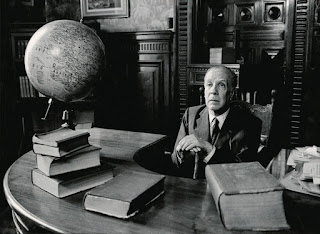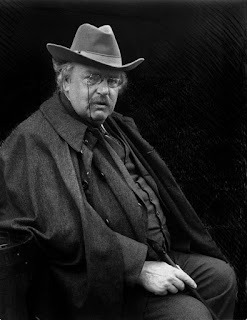On Borges, Chesterton, and Gratitude for Books
I begin this blog because I want a place to record my thoughts on what I read. I hope that this semi-public venue will help to keep me focused on some of the things that matter most to me but from which I often allow the modern world and my own laziness to distract me. I may post the occasional diatribe, but my overall approach will not be one of complaint; instead I want to record and foster a sense of appreciation and thankfulness for good writing and what it brings.
 |
| Borges contemplating his next mini-masterpiece. |
To that end, I wish first to note my gratitude for Jorge Luis Borges. His short fiction never ceases to delight me. He possessed wit, erudition, and a view of the world as filled with mystery. What I admire most about him, however, is his ability to read. He draws connections between works that appear unrelated and his insights are often startling. He seems to have read everything. From Borges one gets, if nothing else, the sense that literature is the most enchanting and pleasurable thing in the world. After reading him, one sees the world as more interesting and strange. How can one not be grateful for that?
I am also grateful for his leading me to authors I have ignored or not known and whom I ended up loving. No other author has so often and so reliably done this for me. The first author and work I discovered via Borges' recommendation was G. K. Chesterton and his Father Brown mysteries. I love them and especially recommend those in the first collection, "The Innocence of Father Brown" (which contains the deeply terrifying "The Flying Stars"). But Chesterton wrote more--much more--than those mysteries. His collected works run to some 37 volumes in the Ignatius Press editions and contain some very fine poetry, a genre that few associate with his name or with the name of Borges, for that matter, even though both wrote quite a bit of it. (You can find a collection of Borges' favorable references to Chesterton here.)
And so I end this first post with the first poem of his I read. It is witty, sensible, a touch melancholy, and above all, well-written. May it bring some enjoyment to who should ever read this post.
"For there is good news yet to hear and fine things to be seen" would be a not inappropriate motto for this blog.
"For there is good news yet to hear and fine things to be seen" would be a not inappropriate motto for this blog.
The Rolling English Road (from the novel "The Flying Inn")
Before the Roman came to Rye or out to Severn strode,
The rolling English drunkard made the rolling English road.
A reeling road, a rolling road, that rambles round the shire,
And after him the parson ran, the sexton and the squire;
A merry road, a mazy road, and such as we did tread
The night we went to Birmingham by way of Beachy Head.
Before the Roman came to Rye or out to Severn strode,
The rolling English drunkard made the rolling English road.
A reeling road, a rolling road, that rambles round the shire,
And after him the parson ran, the sexton and the squire;
A merry road, a mazy road, and such as we did tread
The night we went to Birmingham by way of Beachy Head.
I knew no harm of Bonaparte and plenty of the Squire,
And for to fight the Frenchman I did not much desire;
But I did bash their baggonets because they came arrayed
To straighten out the crooked road an English drunkard made,
Where you and I went down the lane with ale-mugs in our hands,
The night we went to Glastonbury by way of Goodwin Sands.
His sins they were forgiven him; or why do flowers run
Behind him; and the hedges all strengthening in the sun?
The wild thing went from left to right and knew not which was which,
But the wild rose was above him when they found him in the ditch.
God pardon us, nor harden us; we did not see so clear
The night we went to Bannockburn by way of Brighton Pier.
My friends, we will not go again or ape an ancient rage,
Or stretch the folly of our youth to be the shame of age,
But walk with clearer eyes and ears this path that wandereth,
And see undrugged in evening light the decent inn of death;
For there is good news yet to hear and fine things to be seen,
Before we go to Paradise by way of *Kensal Green.
* A famous London cemetery
 |
| Chesterton: art-student turned prolific author. |